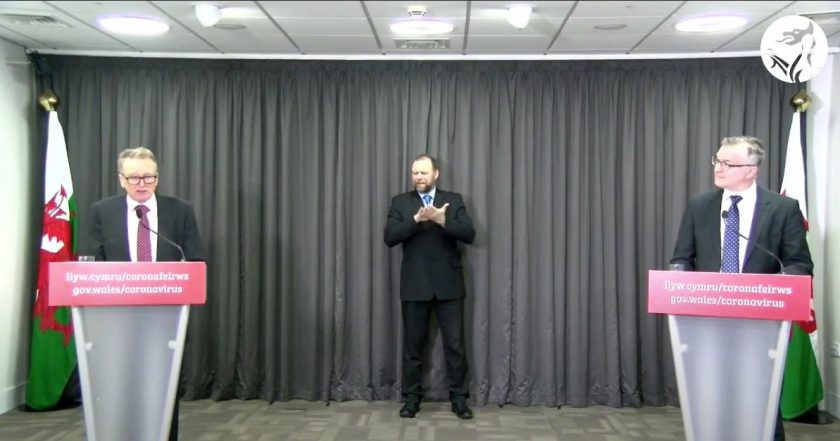Health officials point to ‘encouraging signs’ over Covid-19 cases in Wales – but figures in north east remain the worst

Health officials have pointed to “encouraging signs” in relation to the number of coronavirus cases in Wales.
A joint press conference was held today by chief executive of the NHS in Wales, Dr Andrew Goodall, and Wales’ Chief Medical Officer, Dr Frank Atherton.
They said there were some tentative signs of optimism that cases are “beginning to stabilise” in parts of the country.
However, they cautioned that it would take time for this to have any impact on the current pressures on the NHS.
The number of coronavirus patients in hospitals across Wales is now double the peak of last April.
Dr Goodall said the number of people being admitted with the virus has continued to rise in recent weeks – with 15 per cent of calls made to the Welsh Ambulance Service being covid-related.
Currently there are around 2,870 coronavirus related patients being treated in hospital.
Dr Goodall said: “Today there are 14 hospitals at level three or four, the two highest levels of pressure and three hospitals are at level four.
“We have now exceeded double the peak we experienced during the first wave in April. At that level, the NHS will have to make some very difficult decisions about the balance of services it can provide.
“We would not normally start the very busy winter period with a third of our beds unavailable for normal NHS pressures. This is simply unprecedented.
“My greatest concern at the moment is the impact on critical care, units are under enormous pressure as we continue to see people who are very sick with coronavirus admitted to critical care across Wales.
“There are now 150 people in critical care units with coronavirus, this is the highest level that we have seen during the second wave. This is almost our entire non-pandemic critical care capacity and use.
“The average age of people in critical care is 59 and almost twice as many men are admitted as women.
“We are currently operating at 152 per cent of critical care normal capacity, and have opened many more beds as we’ve seen the number of people who need this highly specialised support reached record levels.
“It is only possible to care for these people by stopping other NHS activities and opening more critical care beds in other clinical areas, such as theatres and specialist clinical environments and by using other staff to support specialists, critical care staff.
“Very sadly, about 38 per cent of people with Coronavirus who have needed critical care did not survive. Because we have seen higher numbers of admissions in the second wave, we have seen a higher number of deaths therefore in critical care.
“The last few weeks have been sobering and extremely difficult for staff throughout the NHS. High levels of positive cases in the community leads to more hospital admissions, more seriously ill patients, including in critical care, and ultimately two more deaths.”
Dr Goodall added: “Many frontline staff have spoken about their experiences at the centre of the response to this terrible and unforgiving virus.
“I’m very grateful to them for being prepared to speak about delivering care in the NHS at the moment.
“Please listen to what they are saying, they are telling you that this is very real and the pandemic is having a significant impact on patients and on staff.”
Dr Atherton said there are some cautious signs that cases across parts of Wales could be levelling off.
However the north east of Wales, particularly Wrexham and Flintshire, are continuing to see high numbers of cases each day.
Today saw an increase of 187 on the daily reported cases for Wrexham – the highest in Wales – with the proportion of positive tests standing at 34%.
The seven day rolling benchmark figure up to the 8th January is now 970.9 per 100k – again the highest in Wales.
Flintshire is currently second in Wales, with 710 cases per 100k, and saw an additional 121 confirmed cases today, which was the third worst in Wales with only Cardiff and Wrexham ahead.
Dr Atherton said cases in the area are likely being driven by the new, highly infectious strain of the virus.
He said: “There are some encouraging signs over the last few days that coronavirus is beginning to stabilise in Wales, but we need to be very careful about how we interpret that because the situation certainly remains very serious.
“We’re still dealing with the added factor of the the new variant, the highly contagious strain of the virus that we talked about last week.
“We also need to be very cautious because we know that even when things do stabilise in Wales and in the rest of the UK, they can take off very quickly.”
Top picture: Latest admissions data on the PHW dashboard, with the green line being the local health board week ending the 10th of Jan, showing a rise to 147 people.
Spotted something? Got a story? Send a Facebook Message | A direct message on Twitter | Email news@north.wales






